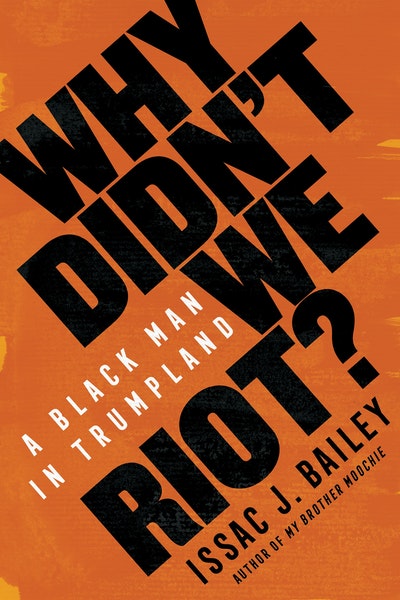- Published: 7 April 2022
- ISBN: 9781635422214
- Imprint: Other Press
- Format: Paperback
- Pages: 192
- RRP: $36.00
Why Didn't We Riot?
A Black Man in Trumpland
- Published: 7 April 2022
- ISBN: 9781635422214
- Imprint: Other Press
- Format: Paperback
- Pages: 192
- RRP: $36.00
“A powerful lesson in history and truth…Through a combination of poignant memoir and social and cultural analysis, Bailey tackles a range of hot topics as well as his own prior complacency. A masterful storyteller…Bailey pulls no punches…Brilliant, searing, and surprisingly vulnerable.” —Kirkus Reviews (starred review) “[Bailey’s essays] are incisive as they confront the realities of systemic racism in America…essential reading.” —Foreword Reviews “This is such a timely book, delivered into our hands at precisely the moment when we are reckoning with the cruel legacies of racism and inequality in a manner we never have before. A searing, honest, and essential read for anyone who wishes to know how we got here, and how we might escape.” —Tope Folarin, author of A Particular Kind of Black Man “In Issac J. Bailey’s book, James Baldwin meets James Bond—that is, Bailey performs a kind of racial spy mission, bringing back intelligence from deep in Trumpland about the kind of thinking that continues to have disastrous consequences for our country. Why Didn’t We Riot? is a very important book.” —Clifford Thompson, author of What It Is: Race, Family, and One Thinking Black Man’s Blues Praise for My Brother Moochie: “With a keen understanding of systemic racism…My Brother Moochie delves into a rarely explored side of the criminal justice system: the families of the perpetrators…powerful.” —New York Times Book Review “Bailey’s memoir is a triumph, a painful indictment of American inhumanity woven with threads of grace and love…an extraordinary book about crime, punishment, redemption, and the empowerment that can spring from adversity…nuanced, original, and remarkably clear-sighted.” —The Guardian “An elegant memoir that speaks to the inequities of the criminal justice system and the damage done to family and community when loved ones are locked away…Bailey tells his story with a raw honesty [and] boldly examines the fault lines etched so sharply in our current cultural landscape.” —USA Today




